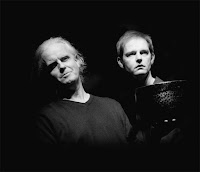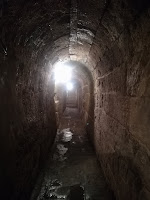This week I attended a conference organized by the Haus der Märchen und Geschichten of Aachen, and the University of Cologne with the support of FEST. The conference was on the contemporary adaptations and associations of Homer's Odyssey. I was invited to present a lecture on my dissertation topic (soon to be published as a book with a hot half-naked gladiator on the cover), forum-based role-playing games as a form of digital storytelling.
Incidentally, this was also my first time ever visiting Germany.
I arrived in Cologne on a Wednesday, and since I was greeted by icy winds and rain (later turning into a hailstorm and a nearby tornado), I spent the time before my AirBnB became available inside the cathedral. It is a gorgeous Gothic building that one can spend a lot of time inside. Among many interesting things, I got to see the reliquary of the Magi, of which I have fond memories from university lectures taught by Dr. Németh György (apparently, the reason why Balthasar is usually portrayed as a black man can be traced back to a Roman gemma used to decorate this reliquary). I cheerfully wandered around the cathedral for a few hours, grateful for all the things to see - since the nearby Roman-Germanic Museum proved to be stubbornly closed to visitors.
The conference itself took place in one of the lecture halls of the University of Cologne. Most of the presentations were in German, which I could more or less follow in the morning, but by the afternoon, my brain was beginning to lose track of things. Still, I was proud of catching the gist. There were presentations on the narrative structure of Homer's Odyssey (Dr. Katharina Kostopoulos), the adaptations of the epic into film and comics (Dr. Michael Kleu), Assassin's Creed Odyssey and its historical and narrative elements, and Odyssey motifs in Tad Williams' novels (Dr. Simon Lentzsch). I myself talked about forum-based role-playing games, their similarities to certain mechanics of oral tradition, and how they adapt mythical characters and stories into text-based gaming. Participants were eager and interested, and we had some good Q&A after the lecture.
The treat of the day was, obviously, the storytelling. Daniel Morden and Hugh Lupton were invited to tell us their two-hour rendering of the Odyssey, in English. Both of them are masterful storytellers, and hearing the epic told by them, coming alive in spoken word, gave me chills all over. The organizers made sure we had hot tea, cookies, and chocolate, so that we could appropriately immerse ourselves in the listening experience. It was a lovely way to spend the morning.
In the evening, we closed the conference with a free and lively discussion, and invited the remaining participants to join us for delicious dinner at a small café. It was a great company of researchers, Classicists, storytellers, gamers, and other fun people.
Since my flight was scheduled for the evening of the next day, I had another half a day to explore Cologne. Getting off the tram at Neumarkt I ran straight into the March 15th #FridaysforFuture march, and got to witness thousands of children and teenagers protesting for climate action. It was an incredible experience that restored a lot of my faith in humanity. The kids are here to save us all.
Since it was also raining pretty hard by then, I decided to underground, and visit the Roman Praetorium. It is a great archaeological site that no one else seemed to be interested in at the time, so I got to wander around alone in the Roman sewer system and the covered ruins area. (The sewers also figure into a fun legend about the building of the cathedral, in which they allegedly were dug out by the devil.)
It was a short trip, but a lot of fun. Cologne is a nice city, and the conference was great - not just because of the storytelling, but because I got to see so many researchers from different fields come together to share our enthusiasm for old stories and new adaptations. I hope FEST will support other events like this in the future. Game on, people! :)





Sounds like you had a wonderful time and learned lots! Those Roman tunnels sound fascinating.
ReplyDelete